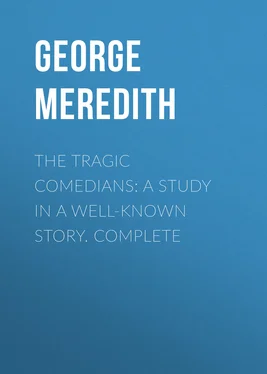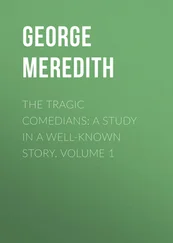George Meredith - The Tragic Comedians - A Study in a Well-known Story. Complete
Здесь есть возможность читать онлайн «George Meredith - The Tragic Comedians - A Study in a Well-known Story. Complete» — ознакомительный отрывок электронной книги совершенно бесплатно, а после прочтения отрывка купить полную версию. В некоторых случаях можно слушать аудио, скачать через торрент в формате fb2 и присутствует краткое содержание. Жанр: foreign_dramaturgy, literature_19, Драматургия, foreign_antique, foreign_prose, на английском языке. Описание произведения, (предисловие) а так же отзывы посетителей доступны на портале библиотеки ЛибКат.
- Название:The Tragic Comedians: A Study in a Well-known Story. Complete
- Автор:
- Жанр:
- Год:неизвестен
- ISBN:нет данных
- Рейтинг книги:4 / 5. Голосов: 1
-
Избранное:Добавить в избранное
- Отзывы:
-
Ваша оценка:
- 80
- 1
- 2
- 3
- 4
- 5
The Tragic Comedians: A Study in a Well-known Story. Complete: краткое содержание, описание и аннотация
Предлагаем к чтению аннотацию, описание, краткое содержание или предисловие (зависит от того, что написал сам автор книги «The Tragic Comedians: A Study in a Well-known Story. Complete»). Если вы не нашли необходимую информацию о книге — напишите в комментариях, мы постараемся отыскать её.
The Tragic Comedians: A Study in a Well-known Story. Complete — читать онлайн ознакомительный отрывок
Ниже представлен текст книги, разбитый по страницам. Система сохранения места последней прочитанной страницы, позволяет с удобством читать онлайн бесплатно книгу «The Tragic Comedians: A Study in a Well-known Story. Complete», без необходимости каждый раз заново искать на чём Вы остановились. Поставьте закладку, и сможете в любой момент перейти на страницу, на которой закончили чтение.
Интервал:
Закладка:
‘I was going to say, I think I understand, but you run away with me still.’
‘May the sensation never quit you!’
‘It will not.’
‘What a night!’ Alvan raised his head: ‘A night cast for our first meeting and betrothing! You are near home?’
‘The third house yonder in the moonlight.’
‘The moonlight lays a white hand on it!’
‘That is my window sparkling.’
‘That is the vestal’s cresset. Shall I blow it out?’
‘You are too far. And it is a celestial flame, sir!’
‘Celestial in truth! My hope of heaven! Dian’s crescent will be ever on that house for me, Clotilde. I would it were leagues distant, or the door not forbidden!’
‘I could minister to a good knight humbly.’
Alvan bent to her, on a sudden prompting:
‘When do father and mother arrive?’
‘To-morrow.’
He took her hand. ‘To-morrow, then! The worst of omens is delay.’
Clotilde faintly gasped. Could he mean it?—he of so evil a name in her family and circle!
Her playfulness and pleasure in the game of courtliness forsook her.
‘Tell me the hour when it will be most convenient to them to receive me,’ said Alvan.
She stopped walking in sheer fright.
‘My father—my mother?’ she said, imaging within her the varied horror of each and the commotion.
‘To-morrow or the day after—not later. No delays! You are mine, we are one; and the sooner my cause is pleaded the better for us both. If I could step in and see them this instant, it would be forestalling mischances. Do you not see, that time is due to us, and the minutes are our gold slipping away?’
She shrank her hand back: she did not wish to withdraw the hand, only to shun the pledge it signified. He opened an abyss at her feet, and in deadly alarm of him she exclaimed: ‘Oh! not yet; not immediately.’ She trembled, she made her petition dismal by her anguish of speechlessness. ‘There will be such… not yet! Perhaps later. They must not be troubled yet—at present. I am… I cannot—pray, delay!’
‘But you are mine!’ said Alvan. ‘You feel it as I do. There can be no real impediment?’
She gave an empty sigh that sought to be a run of entreaties. In fear of his tongue she caught at words to baffle it, senseless of their imbecility: ‘Do not insist: yes, in time: they will—they—they may. My father is not very well… my mother: she is not very well. They are neither of them very well: not at present!—Spare them at present.’
To avoid being carried away, she flung herself from the centaur’s back to the disenchanting earth; she separated herself from him in spirit, and beheld him as her father and mother and her circle would look on this pretender to her hand, with his lordly air, his Jew blood, and his hissing reputation—for it was a reputation that stirred the snakes and the geese of the world. She saw him in their eyes, quite coldly: which imaginative capacity was one of the remarkable feats of cowardice, active and cold of brain even while the heart is active and would be warm.
He read something of her weakness. ‘And supposing I decide that it must be?’
‘How can I supplicate you!’ she replied with a shiver, feeling that she had lost her chance of slipping from his grasp, as trained women of the world, or very sprightly young wits know how to do at the critical moment: and she had lost it by being too sincere. Her cowardice appeared to her under that aspect.
‘Now I perceive that the task is harder,’ said Alvan, seeing her huddled in a real dismay. ‘Why will you not rise to my level and fear nothing! The way is clear: we have only to take the step. Have you not seen tonight that we are fated for one another? It is your destiny, and trifling with destiny is a dark business. Look at me. Do you doubt my having absolute control of myself to bear whatever they put on me to bear, and hold firmly to my will to overcome them! Oh! no delays.’
‘Yes!’ she cried; ‘yes, there must be.’
‘You say it?’
The courage to repeat her cry was wanting.
She trembled visibly: she could more readily have bidden him bear her hence than have named a day for the interview with her parents; but desperately she feared that he would be the one to bid; and he had this of the character of destiny about him, that she felt in him a maker of facts. He was her dream in human shape, her eagle of men, and she felt like a lamb in the air; she had no resistance, only terror of his power, and a crushing new view of the nature of reality.
‘I see!’ said he, and his breast fell. Her timid inability to join with him for instant action reminded him that he carried many weights: a bad name among her people and class, and chains in private. He was old enough to strangle his impulses, if necessary, or any of the brood less fiery than the junction of his passions. ‘Well, well!—but we might so soon have broken through the hedge into the broad highroad! It is but to determine to do it—to take the bold short path instead of the wearisome circuit. Just a little lightning in the brain and tightening of the heart. Battles are won in that way: not by tender girls! and she is a girl, and the task is too much for her. So, then, we are in your hands, child! Adieu, and let the gold-crested serpent glide to her bed, and sleep, dream, and wake, and ask herself in the morning whether she is not a wedded soul. Is she not a serpent? gold-crested, all the world may see; and with a mortal bite, I know. I have had the bite before the kisses. That is rather an unjust reversal of the order of things. Apropos, Hamlet was poisoned—ghost-poisoned.’
‘Mad, he was mad!’ said Clotilde, recovering and smiling.
‘He was born bilious; he partook of the father’s constitution, not the mother’s. High-thoughted, quick-nerved to follow the thought, reflective, if an interval yawned between his hand and the act, he was by nature two-minded: as full of conscience as a nursing mother that sleeps beside her infant:—she hears the silent beginning of a cry. Before the ghost walked he was an elementary hero; one puff of action would have whiffed away his melancholy. After it, he was a dizzy moralizer, waiting for the winds to blow him to his deed-ox out. The apparition of his father to him poisoned a sluggish run of blood, and that venom in the blood distracted a head steeped in Wittenberg philosophy. With metaphysics in one and poison in the other, with the outer world opened on him and this world stirred to confusion, he wore the semblance of madness; he was throughout sane; sick, but never with his reason dethroned.’
‘Nothing but madness excuses his conduct to Ophelia!’
‘Poison in the blood is a pretty good apology for infidelity to a lady.’
‘No!’
‘Well, to an Ophelia of fifty?’ said Alvan.
Clotilde laughed, not perfectly assured of the wherefore, but pleased to be able to laugh. Her friends were standing at the house door, farewells were spoken, Alvan had gone. And then she thought of the person that Ophelia of fifty might be, who would have to find a good apology for him in his dose of snake-bite, or love of a younger woman whom he termed gold-crested serpent.
He was a lover, surely a lover: he slid off to some chance bit of likeness to himself in every subject he discussed with her.
And she? She speeded recklessly on the back of the centaur when he had returned to the state of phantom and the realities he threatened her with were no longer imminent.
CHAPTER V
Clotilde was of the order of the erring who should by rights have a short sermon to preface an exposure of them, administering the whip to her own sex and to ours, lest we scorn too much to take an interest in her. The exposure she had done for herself, and she has not had the art to frame her apology. The day after her meeting, with her eagle, Alvan, she saw Prince Marko. She was gentle to him, in anticipation of his grief; she could hardly be ungentle on account of his obsequious beauty, and when her soft eyes and voice had thrilled him to an acute sensibility to the blow, honourably she inflicted it.
Читать дальшеИнтервал:
Закладка:
Похожие книги на «The Tragic Comedians: A Study in a Well-known Story. Complete»
Представляем Вашему вниманию похожие книги на «The Tragic Comedians: A Study in a Well-known Story. Complete» списком для выбора. Мы отобрали схожую по названию и смыслу литературу в надежде предоставить читателям больше вариантов отыскать новые, интересные, ещё непрочитанные произведения.
Обсуждение, отзывы о книге «The Tragic Comedians: A Study in a Well-known Story. Complete» и просто собственные мнения читателей. Оставьте ваши комментарии, напишите, что Вы думаете о произведении, его смысле или главных героях. Укажите что конкретно понравилось, а что нет, и почему Вы так считаете.












